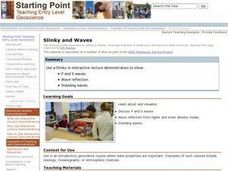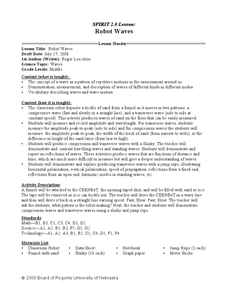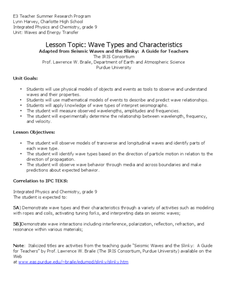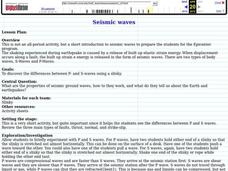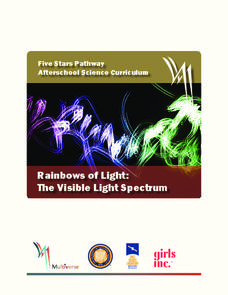LABScI
Acoustics: The Sound Lab
If the delay between a sound and its echo is less than 1/10th of a second, the human ear can’t distinguish it. Through the use of a Slinky, rubber band guitar, and straws, scholars explore where sound comes from and how it travels....
Curated OER
Wave Motion
Students observe and identify various waves. In this wave motion lesson, student use a Slinky, noise, people, and musical instruments to create waves and observe how each type of wave moves.
Curated OER
Make Waves
Sixth graders discover, through exploration, the basic characteristics of waves. After a lecture/demo, 6th graders work in groups and participate in a series of labs where they investigate waves. Each group presents its findings to the...
Curated OER
Sound
Third graders explore sound. They describe sounds in terms of their properties and explain how sounds are made. Students discuss how various sounds sound to their ears and how sound travels in waves.
California Academy of Science
Earthquakes and Tectonic Plates
Here is a comprehensive package in which middle schoolers learn about types of seismic waves, triangulation, and tectonic plate boundaries. Complete vocabulary, colorful maps, and a worksheet are included via links on the webpage. You...
Curated OER
Slinky and Waves
Young scholars watch a demonstration using a Slinky during a lecture on basic wave properties. Properties addressed in the demo include wave speed, wave length, amplitude, period, and frequency.
Curated OER
Waves Velocity & Particle Velocity
In this physics learning exercise, students examine a single wave pulse which travels down a slinky. Then they sketch a single ring of the slinky as the wave goes by and determine whether the wave is constant or not.
Curated OER
Earthquake Waves And Their Destructions
Students investigate primary and secondary waves and how to measure the magnitude of waves. They discover how to find the epicenter of earthquakes. They examine why waves are more destructive in some areas than others through these...
Curated OER
Robot Waves
Learners differentiate the properties of longitudinal and transverse waves. In this physics lesson, students calculate CEENBoT's rate of propagation by measuring its frequency and distance per cycle. They use a mathematical formula...
Curated OER
Applied Science - Physics (5A) Pre Lab
Fifth graders look at different types of waves. In this wave lesson plan, 5th graders find the difference and similarities of electromagnetic and physical waves. They review the components of waves such as crest, trough, wavelength, and...
Curated OER
Keep on Standing!!
Students construct an earthquake simulator and create building models to test. In this earthquake lesson, students use the Internet and a slinky to demonstrate P and S waves. They construct an earthquake simulator as a class and use it...
Curated OER
Dynamic Earth
Young scholars show how earthquakes affect sea waves. In this tidal waves instructional activity students use a rubber mallet on a table to create waves in a box on top of the table. They experiment with striking the mallet in different...
Curated OER
Differential Thermal Calorimetry
Students access prior knowledge of infrared rays, ultraviolet rays, gamma rays, x-rays and cosmic waves. In this electromagnetic waves lesson, students hold a mock trial electromagnetic spectrum. Students present characteristics of the...
Curated OER
From Bats to Babies: Ultrasound
High schoolers research and analyze sound waves and how an ultrasound works to image a baby in utero. They explore various websites, complete worksheets, and write a paragraph describing a demonstration they view in the classroom.
Curated OER
Earthquakes
Students inspect the causes and effects of earthquakes and examine how seismic waves travel. In this earthquake instructional activity, students determine where earthquakes happen and why, before determining how to build an earthquake...
NASA
Tools to Study Tornadoes and Galaxies
Take your class on an intergalactic journey as they explore the galaxy and various meteorological events taking place in our atmosphere each day. Learners investigate electromagnetic waves and the Doppler Effect before gathering radar...
Curated OER
Wave Types and Characteristics
Ninth graders identify the different parts of a wave. In this physics activity, 9th graders observe wave behavior as it travels through a boundary. They determine the relationship between wavelength, frequency and velocity.
Curated OER
Seismic waves
Students discover the differences between P- and S-waves using a slinky. They see that when displacement occurs along a fault, the built up strain of energy is released in the form of seismic waves.
Curated OER
Waves: Understanding the Motion of Waves
Students demonstrate the motion of waves. In this wave lesson, students demonstrate the various attributes to waves and the properties through a variety of hands-on activities.
Curated OER
Measuring the Speed of a Wave
Students create an experiment in which they measure the speed of a wave and record the data in a graph. They work in small groups to write the procedure for the experiment and share it with another group for cross checking of the...
Multiverse
Rainbows of Light: The Visible Light Spectrum
Rainbows can teach us about the visible light spectrum. Learners observe multiple items that clearly display a rainbow to develop better connections. The lesson then explains wavelength using a rope to make waves.
Curated OER
From Vibration to Sound
Students observe a series of demonstrations to illustrate wave movement. In this sound wave lesson plan, students witness how objects create waves when dropped in a dish of water, use a rope and slinky to produce transverse and...
Curated OER
What Wavelength Was That?
A combination of informative text, photos, and graphics comprise this sharp show on electromagnetic radiation. Some slides mention hands-on activities for demonstrating concepts, so if you want to include them you will need to figure out...
Curated OER
HW Unit 10:2-Harmonic Motion
In this harmonic motion instructional activity, students answer 9 questions about pendulums, a slinky and characteristics of harmonic motion. They identify the changes in waves as the amplitude gets bigger and interpret a graph of...





